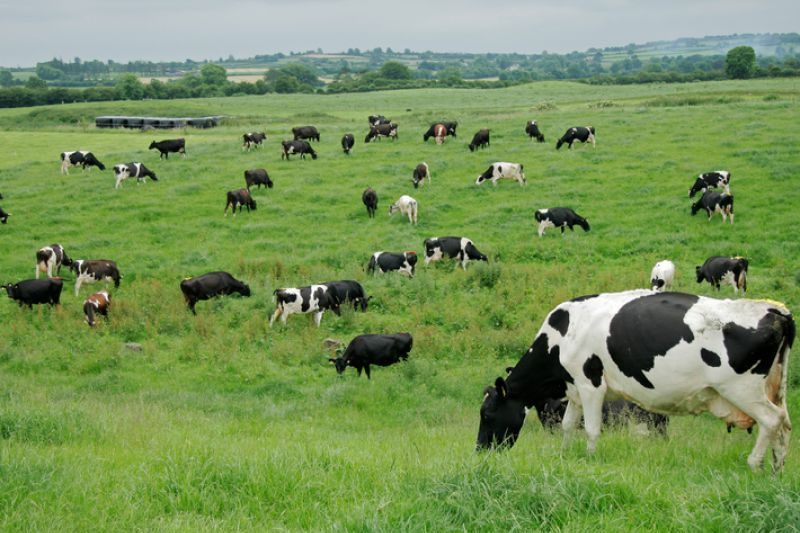Farming
Wales ‘risks hundreds of sustainable firms’ by scrapping organic farming support

THE WELSH GOVERNMENT has come under fire for its plans to withdraw support for organic farming, posing an “existential threat” to hundreds of sustainable food and farming businesses.
In a post-Brexit overhaul of farm support intended to bolster sustainable farming, £3.1 million of support is being withdrawn from Wales’ nature-friendly farming pioneers – according to the Welsh Organic Forum.
Funding that organic farmers currently receive for delivering environmental benefits is due to end at the end of 2023, and the interim Agri-Environment Scheme for 2024 has no provision to replicate this support.
When farmers are already struggling with rising costs and low farm gate prices due to the cost-of-living crisis, the forum has warned the Welsh First Minister that the move could put hundreds of organic businesses at risk of collapse.
They say it will throw Wales behind England, Scotland, and other EU countries where organic farming is being recognised and supported – and with 50% more wildlife and less energy used on organic farms, the decision is also at odds with the Welsh government’s climate and nature goals.
Open letter to the First Minister
An open letter to the First Minister Mark Drakeford, signed by the Welsh Organic Forum and alarmed businesses and organisations, said: “We are shocked that the Welsh Government looks set to reject a globally recognised beacon of sustainable farming. A withdrawal of support for organic farming will have serious economic and environmental consequences in Wales.
“The decision poses an existential risk to the Welsh food and farming sector’s ability to deliver to our climate, nature and food security obligations. It is likely to precipitate a mass exodus of organic farmers, inflicting long lasting damage on the sector.”
For decades Wales has led the UK in the development of the organic farming movement – Wales currently has the highest proportion of land area certified as organic in the UK.
Scotland is aiming to double its organic farmland by 2030, while the EU is aiming for 25% of all land to be organic by the same deadline. Westminster has committed to delivering an organic standard next year in its new Environmental Land Management Scheme, and to maintaining current funding for organic.
And despite the impacts of the cost-of-living crisis and the pandemic, the organic market in the UK has seen growth for 11 consecutive years.
The forum points out that other nations would be “more than happy to supply our markets” – albeit with risk and disruption to UK businesses who currently rely on Welsh organic produce.
Decades of investment set to be squandered
Welsh organic dairy farmer Haydn Evans, who is chair of the Welsh Organic Forum and Soil Association Cymru’s Head of Farming, said: “It is astounding that the Welsh Government is considering such a short-sighted cost saving exercise when organic farmers have been leading the way in sustainable farming for decades. Decades of the government’s own investment in healthy soils, nature-rich farms and pioneering food businesses now looks set to squandered.
“It’s simply irrational for ministers to turn their back on organic farming in Wales when we only have a few years to turn the tide on catastrophic climate change and nature loss. We urge the Welsh Government to consider the long-term costs to all of us if we lose this important sector that is delivering so much good for wildlife, people, and planet.”
Patrick Holden, Welsh organic dairy farmer and chief executive of the Sustainable Food Trust, said: “As one of Wales’s longest established organic farmers, having just celebrated our 50th anniversary of farming using organic principles and practices, I believe that the decision to withdraw support payments will inflict long-term damage, not just on the organic sector but on Welsh agricultural community as a whole. I suspect that the view taken by the minister, namely “don’t let the best be the enemy of the good” although no doubt well-intentioned, did not take account of the fact that for the last couple of years, organic producers have been really struggling. This decision may represent the final straw for a number of small family dairy farms”.
The forum has called for an urgent meeting with Welsh Government, offering to work with Rural Affairs Minister Lesley Griffiths to secure a future for organic to renew their previous longstanding commitment to the sector.
Business
Farmers cautious but resilient as costs remain high across Wales

Major supplier says confidence lower despite signs of stability returning
FARMERS across Wales are facing another difficult year as input costs remain significantly higher than before the pandemic, according to new industry insight from agricultural supplier Wynnstay Group.
The company, which has deep roots in rural Wales and generates around sixty per cent of its retail revenue in the country, says confidence among farmers is lower than this time last year, with rising costs, policy uncertainty and tightening margins influencing spending decisions.
However, there are also signs of resilience, with many producers focusing on efficiency and forward planning to cope with ongoing pressures.

Wales at heart of business
Wynnstay, originally founded by tenant farmers in Mid Wales in 1918, has grown into a major UK agricultural supplier serving more than 20,000 farming customers through manufacturing sites, stores and on-farm services. The group employs hundreds of staff across the UK and operates a nationwide distribution network supporting livestock and arable producers.
The company says Welsh farming businesses continue to play a central role in its commercial performance and long-term growth strategy.
Cautious investment decisions
According to Wynnstay, farmers are delaying some investment decisions but are increasingly seeking value-driven solutions that improve productivity.
Feed volumes have increased across the company’s Welsh store network over the past year, reflecting demand for blended feeds that offer greater flexibility and cost control. Rather than reducing purchases outright, many farmers are matching spending more closely to performance and output.
Fertiliser demand has also been strong, with sales ahead of last year, although some farmers have delayed buying in the hope prices may fall. Global supply pressures and rising gas costs mean prices are expected to remain firm into the busy spring season.

Costs still far above pre-Covid levels
Industry data shows overall farm input costs remain significantly higher than before 2020, with feed, fertiliser, fuel, electricity and machinery all continuing to put pressure on farm margins.
While some costs have eased from their peaks, they have not returned to previous levels, influencing buying behaviour across the sector.
Margins for livestock and dairy farms were strong last year, but Wynnstay says they are now tightening, particularly in the dairy sector where milk prices have fallen and volatility remains high.

Pressure on family farms
Smaller family-run farms are under greater strain than larger commercial operations, with less financial resilience to absorb rapid market changes. Reports of rising closures among family farms, particularly in dairy, reinforce concerns about the sector’s long-term sustainability.
Government policy changes are also contributing to uncertainty. The transition away from the Basic Payment Scheme and wider tax reforms have led many farmers to postpone larger investments until there is clearer long-term stability.

Local reaction
Pembrokeshire farmer Chris James said the situation reflected what many farmers were experiencing locally.
“We’ve definitely noticed the squeeze over the past year or two,” he said. “Costs for feed, fertiliser and fuel are still much higher than they used to be, and that makes you think twice about every decision. Most farmers I know aren’t cutting back on production — they’re just trying to be more efficient and careful with spending.”
He added: “People want to invest and move forward, but it’s hard when you don’t know exactly what the long-term policy picture will look like.”
NFU Cymru has also warned that rising costs and policy uncertainty continue to weigh heavily on farm businesses across Wales, with confidence affected by concerns over future support schemes and wider economic challenges. The union has called for greater long-term certainty to allow farmers to invest with confidence and maintain domestic food production.

Weather shocks impact behaviour
Extreme weather during 2025 — including a very dry spring followed by periods of intense heat and a challenging wet autumn — also affected purchasing patterns, with farmers spacing orders and prioritising essential inputs as conditions changed.
Ordering behaviour is now returning to more normal patterns as conditions stabilise.
Outlook for 2026
Despite ongoing pressures, Wynnstay says it is cautiously optimistic about the year ahead.
Many farmers are making careful decisions around efficiency, nutrition and planning, and the company believes there are opportunities for businesses to strengthen their position through 2026 with good cost control and smart investment.
Summing up the sector, the company said Welsh agriculture remains resilient, with farmers showing determination and adaptability despite continuing challenges.
Farming
Growing fodder beet could be attractive option after difficult 2025 forage season

AFTER the lack of forage in many areas in 2025 due to the drought, this season could see increased interest in growing fodder beet on livestock farms, believes ProCam agronomist, Nick Duggan.
Once fodder beet gets its roots down, it can be quite drought tolerant, says Nick, so it could appeal to farmers looking to diversify forage crops to mitigate risk.
“Although inputs can be quite high, fodder beet does offer a big crop of energy,” explains Nick, who operates in Herefordshire, South Shropshire, Powys and the Cotswolds.
“Compared with stubble turnips yielding about 4-6t of dry matter/ha (DM/ha), fodder beet might yield 20t DM/ha. And, at around 12.5ME, the energy content of its roots is similar to grass.
“There’s also the flexibility to feed fodder beet to sheep, beef or dairy, and to lift or graze it, although it’s important to ‘wean’ livestock onto it gradually, especially cattle, because its high energy content can cause acidosis,” he adds.
To help ensure that farmers grow the right varieties for their situation based on robust data, Nick says ProCam has been evaluating the performance of fodder beet varieties over multiple seasons, with on-farm trials conducted in the North and West of the country as well as other locations country wide.
“We test a range of varieties,” he continues. “These range from low DM beets for grazing, to high energy types for lifting and chopping for livestock, or for use in anaerobic digestion (AD) plants.
“Typically, 20 or so varieties might be tested annually in these replicated trial plots, with 4-5 new varieties included each year. But a lot of the established varieties have been in the trial for maybe six years – so we have long term data and can robustly benchmark new varieties.”
Assessments begin with variety emergence and vigour, and conclude at harvest by measuring yields, says Nick, with beets lifted and tops and roots weighed separately. Yields per hectare are then calculated, corrected for %DM.
“Also at harvest, each variety is assessed for disease resilience, and for the amount of root protruding above the soil. More root protruding is helpful if grazing. If lifting beet, you want more root in the ground for protection from frost.
“Agronomically, we encourage all farmers to keep the tops as healthy as possible with a summer nutrition programme. As well as helping to protect roots from frost, a healthy canopy helps sustain the crop into winter. This helps if growing for energy for AD plants, but also tops have good feed value, at about 17% crude protein, and can provide 2-2.5t DM/ha.”
In addition to evaluating varieties, ProCam also evaluates the performance of primed seed, says Nick, which is available with certain fodder beet varieties. Primed seed is pre-germinated for faster emergence, and tends to produce more uniform plants at the cotyledon stage, he notes.
“Faster establishment, in turn, helps with weed suppression, and once fodder beet reaches 12 leaves, it becomes more tolerant to virus yellows.
“Plus, primed seed can deliver higher yields. Results can vary, but in five years of trials on the variety Geronimo we saw a yield uplift of approximately 1.5t DM/ha from Active Boost primed seed compared with conventional seed.
“With the unpredictable spring weather we get nowadays, I think primed seed is extremely useful technology for fodder beet growers.”
Photo caption: Fodder beet offers a big crop of energy, and once it gets its roots down it can be quite drought tolerant, says ProCam agronomist, Nick Duggan
Farming
Deputy First Minister raises concerns over fishing funds and farm policy

Funding formula and visa rules among key issues discussed ahead of Senedd election period
THE WELSH Government has voiced concerns over fishing funding allocations, farm policy, and potential labour shortages during a recent UK-wide ministerial meeting on rural affairs.
Deputy First Minister and Cabinet Secretary for Climate Change and Rural Affairs, Huw Irranca-Davies, attended the latest Inter-Ministerial Group for Environment, Food and Rural Affairs meeting on Wednesday (Feb 5), alongside ministers from the UK, Scottish and Northern Ireland governments.
One of the main topics was the UK Fishing and Coastal Growth Fund. Ministers from devolved administrations expressed disappointment that the Barnett formula had been used to determine allocations, arguing it failed to reflect the size and importance of the fishing sector in each nation or previous funding levels.
Talks also covered progress on negotiations for a UK-EU sanitary and phytosanitary (SPS) agreement, which could affect cross-border trade in food, plants and animals. Devolved governments welcomed engagement from the UK Government so far but stressed the need for continued cooperation, particularly around biosecurity and the legislative process required to implement any agreement across the UK.
Ministers also discussed the UK Government’s Farm Profitability Review — known as the Batters Review — and the emerging UK Food Strategy. Although these policies apply mainly to England, ministers noted they could still have implications for Wales and other devolved nations, highlighting the need for collaborative working.
A joint approach to banning peat use in horticulture was also agreed in principle, with the Department for Environment, Food and Rural Affairs (Defra) expected to set out possible timelines.
Concerns were also raised about proposed changes to UK work visa rules, which ministers warned could worsen shortages of seasonal agricultural workers, particularly sheep shearers. UK Government ministers acknowledged the risks and said discussions were ongoing.
The next meeting of the Inter-Ministerial Group is scheduled for March 2026, ahead of the upcoming elections in both Wales and Scotland.
-

 Health6 days ago
Health6 days agoWithybush loses emergency surgery in shock health board decision
-

 Health6 days ago
Health6 days agoHealth board confirms major hospital changes across west Wales
-

 Health5 days ago
Health5 days agoConcerns grow over Bronglais stroke plans as politicians demand clarity
-

 Health6 days ago
Health6 days agoHealth board: Changes will bring “resilience and sustainability” to West Wales services
-

 Local Government3 days ago
Local Government3 days agoCandidate who withdrew from Hakin race will still appear on ballot paper
-

 Business6 days ago
Business6 days agoMounting complaints: More Computer Solutions Wales customers claim losses
-

 News6 days ago
News6 days agoPress regulator backs Herald reporting following Ajay Owen complaint
-

 Local Government4 days ago
Local Government4 days agoFirst Minister left red-faced as Labour candidate pulls out during Hakin campaign visit































